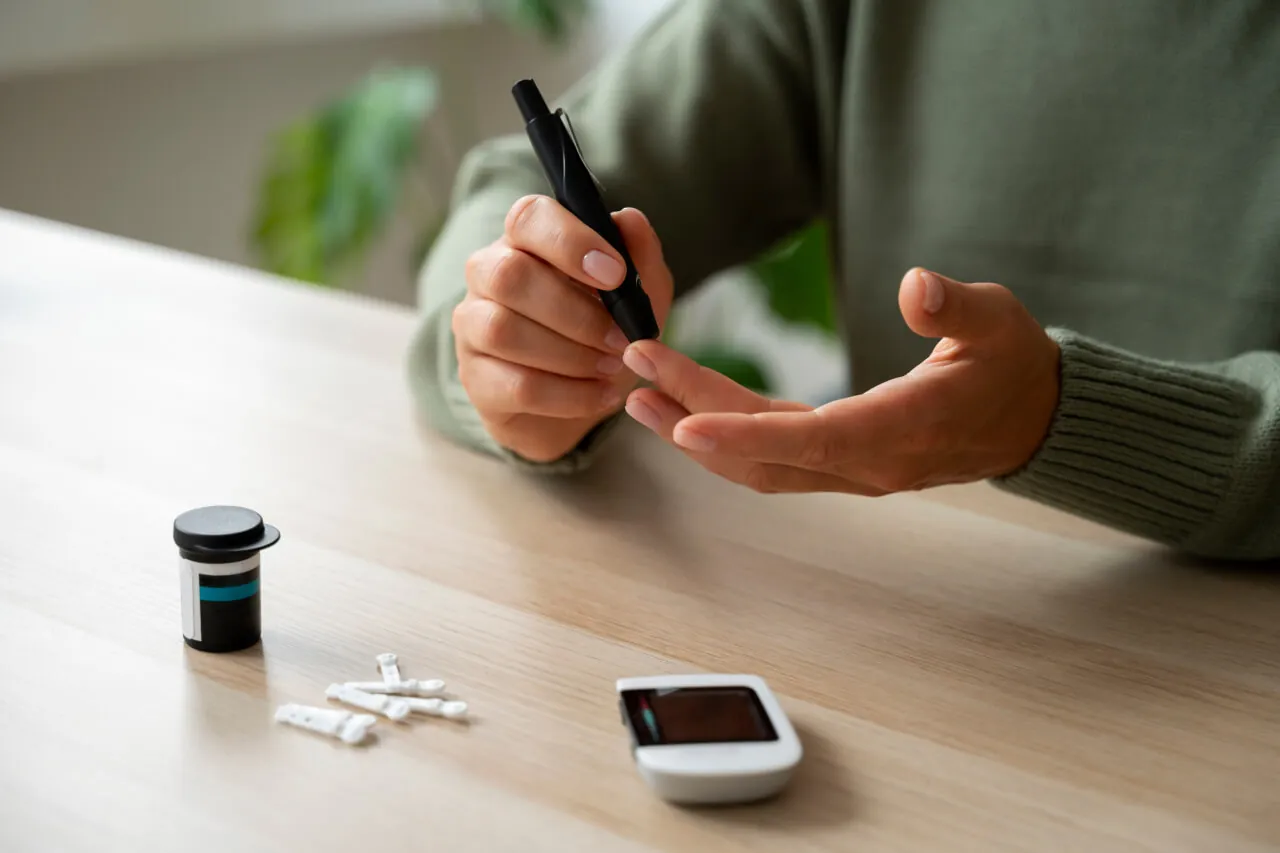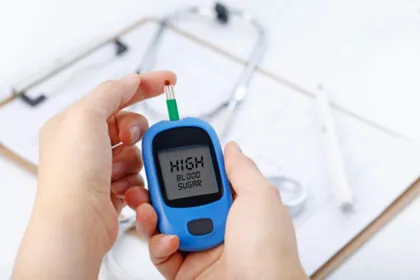CBD for Diabetes is a chronic condition that affects how the body processes glucose, or sugar, in the blood.
Glucose is the main source of energy for the cells.
But when there is too much or too little of it in the blood, it can cause serious health problems.
There are two main types of diabetes: type 1 and type 2.
Type 1 diabetes is an autoimmune disease that destroys the insulin-producing cells in the pancreas, resulting in the need for insulin injections or pumps.
Type 2 diabetes is more common and occurs when the body becomes resistant to insulin or does not produce enough of it, leading to high blood sugar levels.
Blood sugar, or blood glucose, is the amount of sugar in the blood at any given time.
It is influenced by many factors, such as food intake, physical activity, stress, hormones, medications, and other health conditions.
Blood sugar levels are measured in milligrams per deciliter (mg/dL) or millimoles per liter (mmol/L).
A normal range for blood sugar is between 70 and 130 mg/dL (3.9 and 7.2 mmol/L) before meals, and less than 180 mg/dL (10 mmol/L) two hours after eating.
However, these ranges may vary depending on the individual and the type of diabetes.
What are the Symptoms and Causes of diabetes and blood sugar
The symptoms of diabetes and high blood sugar can vary depending on the type and severity of the condition.
Some common symptoms include:
– Increased thirst and urination
– Hunger and weight loss or gain
– Fatigue and weakness
– Blurred vision and headaches
– Numbness or tingling in the hands or feet
– Slow healing of wounds and infections
– Dry skin and itching
– Mood changes and irritability
The causes of diabetes and high blood sugar are not fully understood.
But they involve a combination of genetic, environmental, and lifestyle factors.
Some of the risk factors for developing diabetes and high blood sugar are:
– Family history of diabetes
– Obesity and physical inactivity
– Age and ethnicity
– High blood pressure and cholesterol
– Smoking and alcohol consumption
– Polycystic ovary syndrome (PCOS) and gestational diabetes
– Certain medications and diseases
What are the Needs for CBD for treating diabetes and blood sugar
CBD, or cannabidiol, is a non-psychoactive compound found in cannabis plants.
It has been shown to have various therapeutic effects on the body and the brain, such as anti-inflammatory, anti-oxidant, anti-anxiety, and neuroprotective properties.
CBD for diabetes can also interact with the endocannabinoid system (ECS).
Which is a network of receptors and molecules that regulate various physiological processes, such as appetite, metabolism, pain, mood, and immune function.
CBD may have some potential benefits for treating diabetes and high blood sugar, according to some preliminary studies.
However, more research is needed to confirm the safety and efficacy of CBD for these conditions.
Some of the possible benefits of CBD for diabetes and high blood sugar are:
– Reducing inflammation and oxidative stress, which are linked to insulin resistance and diabetes complications
– Improving insulin sensitivity and glucose uptake, which can lower blood sugar levels and prevent hyperglycemia
– Modulating appetite and weight, which can help prevent obesity and metabolic syndrome
– Alleviating pain and neuropathy, which are common symptoms of diabetes and high blood sugar
– Enhancing mood and well-being, which can reduce stress and anxiety, which can affect blood sugar levels and diabetes management
How CBD can help with diabetes and blood sugar?
CBD can be taken in different forms, such as oils, capsules, edibles, vapes, creams, and patches.
The dosage and frequency of CBD for diabetes depend on various factors, such as the type and severity of the condition.
The body weight and metabolism, the quality and potency of the product, and the individual preference and tolerance.
It is advisable to start with a low dose and gradually increase it until the desired effects are achieved.
It is also important to consult with a doctor before using CBD, especially if you have diabetes or high blood sugar, or if you are taking any medications or supplements.
CBD can help with diabetes and high blood sugar by:
– Reducing inflammation and oxidative stress:
CBD for diabetes and Blood Sugar can activate the CB2 receptors in the ECS, which are mainly found in the immune cells and tissues.
This can reduce the production of pro-inflammatory cytokines and reactive oxygen species.
Which can damage the cells and tissues and cause insulin resistance and diabetes complications.
CBD for diabetes and Blood Sugar can also increase the levels of anti-inflammatory cytokines and antioxidants, which can protect the cells and tissues and improve insulin sensitivity and glucose uptake.
– Improving insulin sensitivity and glucose uptake:
CBD can inhibit the activity of the enzyme that breaks down anandamide, which is an endocannabinoid that binds to the CB1 receptors in the ECS.
These receptors are mainly found in the brain and the peripheral organs, such as the liver, pancreas, and adipose tissue.
By increasing the levels of anandamide, CBD for diabetes and Blood Sugar can enhance the signaling of the CB1 receptors.
Which can improve insulin sensitivity and glucose uptake in the cells and tissues.
CBD can also stimulate the expression of the genes that regulate glucose metabolism, such as GLUT4 and PPAR-gamma, which can lower blood sugar levels and prevent hyperglycemia.
– Modulating appetite and weight:
CBD for diabetes and Blood Sugar can affect the appetite and weight by influencing the levels of ghrelin and leptin, which are hormones that regulate hunger and satiety.
CBD can reduce the levels of ghrelin, which is a hormone that stimulates appetite and food intake.
CBD can also increase the levels of leptin, which is a hormone that suppresses appetite and signals fullness.
By modulating these hormones, CBD can help control the calorie intake and the body weight, which can help prevent obesity and metabolic syndrome, which are risk factors for diabetes and high blood sugar.
– Alleviating pain and neuropathy:
CBD can relieve pain and neuropathy by interacting with the TRPV1 receptors, which are ion channels that mediate pain and inflammation.
CBD for diabetes and Blood Sugar can desensitize these receptors, which can reduce the sensation of pain and burning.
CBD for diabetes and Blood Sugar can also activate the serotonin receptors, which are neurotransmitters that modulate pain and mood.
CBD for diabetes and Blood Sugar can increase the levels of serotonin, which can have an analgesic and antidepressant effect.
CBD can also inhibit the reuptake of adenosine, which is a molecule that modulates pain and inflammation.
CBD can increase the levels of adenosine, which can have an anti-inflammatory and neuroprotective effect.
– Enhancing mood and well-being:
CBD for diabetes and Blood Sugar can improve mood and well-being by interacting with the serotonin and dopamine receptors.
Which are neurotransmitters that regulate mood, motivation, and reward.
CBD can increase the levels of serotonin and dopamine, which can have an antidepressant and anxiolytic effect.
CBD can also inhibit the reuptake of noradrenaline, which is a neurotransmitter that modulates stress and anxiety.
CBD for diabetes and Blood Sugar can increase the levels of noradrenaline, which can have a stimulating and energizing effect.
By enhancing mood and well-being, CBD can reduce stress and anxiety, which can affect blood sugar levels and diabetes management.
Conclusion
CBD is a non-psychoactive compound in cannabis that may have some potential for controlling blood sugar, reducing inflammation, and easing pain and neuropathy in people with diabetes.
However, the research on CBD and diabetes is still limited and inconclusive, and more studies are needed to confirm the safety and efficacy of CBD for these conditions.
Therefore, it is not recommended to use CBD as a substitute for conventional diabetes treatments, but rather as a possible complementary or alternative option.
It is also important to consult with a doctor before using CBD for diabetes, especially if you have diabetes or high blood sugar, or if you are taking any medications or supplements.
CBD may have some side effects and interactions, such as drowsiness, dry mouth, diarrhea, fatigue, and changes in appetite and weight.
CBD may also affect the blood sugar levels and the insulin levels, so it is advisable to monitor them closely and adjust the dosage accordingly.
CBD may not work for everyone, and the results may vary depending on the individual and the product.
Therefore, it is advisable to use CBD with caution and under medical supervision, and to seek professional advice if you have any questions or concerns.
FAQs
How can CBD affect blood sugar levels in people with diabetes?
CBD for diabetes may influence blood sugar levels by interacting with cannabinoid receptors in the body’s endocannabinoid system.
It has been observed to improve insulin resistance and reduce inflammation, potentially benefiting individuals with diabetes.
What is the recommended dosage of CBD for managing diabetes-related issues?
CBD dosage can vary based on factors like individual response, body weight, and the specific condition being addressed.
Starting with a low dose and gradually increasing is advisable.
Consultation with a healthcare professional is crucial for personalized guidance.
How long does it take for CBD to show effects on blood sugar levels?
The time for CBD to impact blood sugar levels varies among individuals.
Some may experience changes within a few weeks, while others might take longer.
Consistent and regular use is recommended, and allowing 4 to 6 weeks to assess its full benefits is advised.
Can CBD be used alongside conventional diabetes medications?
It’s essential to consult with a healthcare provider before combining CBD with other diabetes medications.
While generally well-tolerated, potential interactions may occur, and professional guidance ensures safe integration based on individual health conditions.
Are there any potential side effects of using CBD for diabetes? Can it be overdosed?
CBD for diabetes is generally considered safe when taken at recommended dosages.
Excessive intake may lead to mild side effects such as fatigue or digestive issues.
Adhering to suggested dosages and consulting with a healthcare practitioner is crucial, especially for individuals with specific health conditions or allergies.
Is CBD suitable for everyone, including pregnant women and children with diabetes?
Pregnant or breastfeeding women and children with diabetes should consult with a healthcare professional before using CBD.
While CBD for diabetes is generally considered safe, individual health conditions and sensitivities may vary.
Seeking professional guidance ensures the well-being of both the mother and child.





